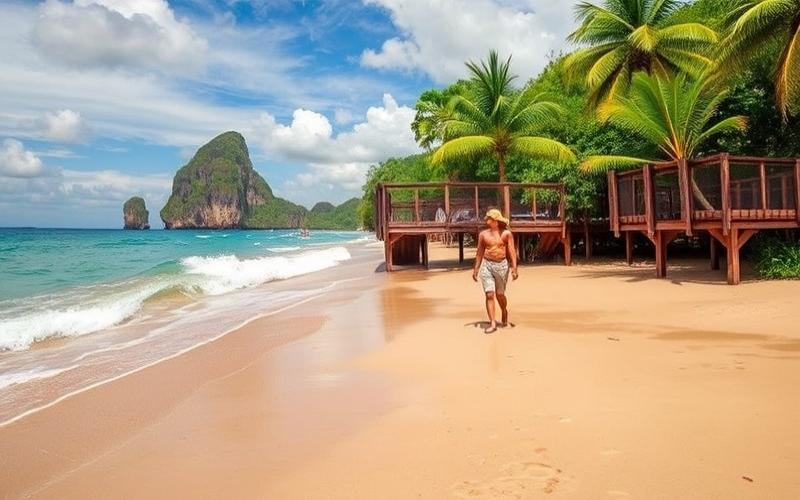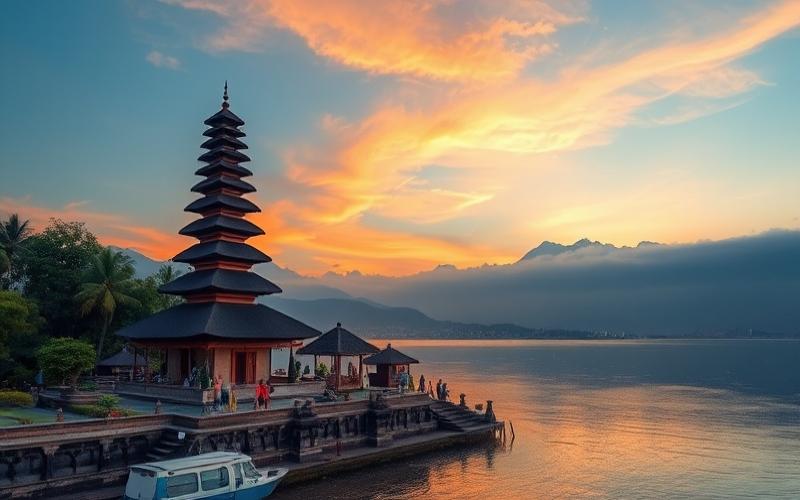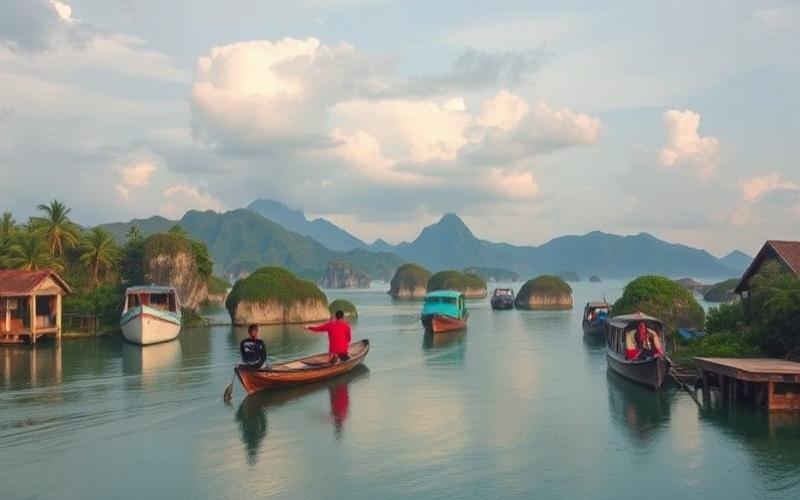
 Published on and written by Cyril Jarnias
Published on and written by Cyril Jarnias
Indonesia, with its breathtaking landscapes and rich culture, is attracting more and more expatriates seeking an overseas adventure. However, before diving into this unique experience, it’s crucial to familiarize yourself with essential safety aspects to ensure a worry-free stay.
This article aims to guide you through the best practices and tips for navigating this fascinating destination while avoiding potential pitfalls. From health conditions to daily safety concerns, we’ll cover every detail to guarantee your expatriation to Indonesia unfolds under the best circumstances.
Indonesia: A Safe Haven for Expatriates?
Indonesia’s Strengths for Expatriates
- Attractive Cost of Living:
- Price levels are significantly lower than in Europe or the United States, particularly for housing, food, and transportation.
- In Bali, life is about 40% cheaper than in France, allowing for a better quality of life, especially for those earning income in foreign currency.
- Concrete example: a liter of fuel in Lombok costs about $0.50.
- Welcoming Culture and Integration:
- Indonesians, and especially Balinese, are known for their hospitality, kindness, and openness to foreigners.
- Integration is facilitated by local friendliness, although some cultural differences may require adaptation, especially for newcomers.
- Dynamic International Communities:
- Major cities like Jakarta, Bali (Ubud, Canggu, Seminyak), Surabaya, or Lombok host large expatriate communities.
- Presence of associations, social media groups, coworking spaces, and international schools facilitating social life and mutual support among expatriates.
Comparative Table: Cost of Living
| Expense Category | Indonesia (Bali, Jakarta) | France (Paris) |
|---|---|---|
| Rent (2-room apt.) | $300–700/month | $1200–1800/month |
| Restaurant Meal | $1.50–5 | $12–25 |
| Local Transport | $0.30–1 | $1.90–2.50 |
“Living in Bali means enjoying an idyllic setting, a relaxed lifestyle, and great cultural diversity. But you have to adapt to administrative slowness and a certain lack of infrastructure outside tourist centers.”
“In Lombok, the cost of living allows me to live much better than in Europe, even on a modest retirement. But you have to accept dealing with power outages and sometimes unreliable internet access.”
Practical Tips for a Successful and Safe Expatriation
- Choose Your Region or Neighborhood Wisely:
- In Bali: Ubud, Sanur, Seminyak, Canggu are known to be safe and suitable for expatriates.
- In Jakarta: neighborhoods like Kemang, Menteng, Pondok Indah, highly sought after for their safety and presence of international services.
- In Lombok and Surabaya: prefer areas close to expatriate centers and medical facilities.
- Always verify rental contract conditions (pre-payment, duration, guarantees) before committing.
- Obtain international health insurance covering evacuation and hospital care.
- Adopt an attitude respectful of local customs to facilitate integration.
- Stay informed about the political situation and safety recommendations issued by embassies.
Key Takeaway: Indonesia offers an attractive lifestyle, low cost of living, a welcoming population, and numerous international communities, but requires cultural adaptation, vigilance regarding safety, and thorough administrative preparation.
Good to Know:
Expatriates in Indonesia appreciate a reasonable cost of living and a hospitable culture, with regions like Bali and Jakarta offering both enhanced safety and dynamic international communities; it’s advisable to favor these areas for a safe expatriation while remaining vigilant about personal and political safety concerns.
Life Tips for a Safe Expatriation Experience
Life Tips for a Safe Expatriation in Indonesia:
Secure Housing
Prefer neighborhoods known to be safe (e.g., Canggu, Seminyak, Ubud in Bali). Choose a residence with security guards or surveillance, install additional locks, and never leave valuables visible. Ask a trusted neighbor to watch your home during extended absences.
Concrete example: Opt for a villa in a secure complex with CCTV and a 24/7 guard.
Adequate Health Insurance
Subscribe to international health insurance covering medical expenses and medical evacuation. Check exclusions and coverage extent (hospitalization, repatriation, specialist consultation).
Practical Resource: CFE (Caisse des Français de l’Étranger) or ACS offer insurance dedicated to expatriates.
Avoiding Common Scams
Use only official taxis or reliable ride-hailing apps (Grab, Gojek). Be wary of overly attractive online offers, fake real estate agents, and requests for unsecured payments.
Example: Always visit a property in person before paying a deposit.
Recognizing and Avoiding Risk Areas
Avoid protest areas (Jakarta, Surabaya, Makassar) and follow local alerts for natural hazards (volcanoes, earthquakes). Inquire about maritime areas prone to piracy and avoid unsupervised beaches or swimming outside authorized zones.
| Risk Area | Avoidance Measure |
|---|---|
| Urban Protests | Follow news, avoid gatherings |
| Volcanic Activity | Consult local alerts, avoid red zones |
| Dangerous Beaches | Swim only in supervised areas |
| Maritime Piracy | Do not sail outside official routes |
Integration into the Local Community
Participate in local events, join expatriate groups, learn some basics of the Indonesian language, and seek help from neighbors to ease adaptation.
Resource: French or international associations on site, expatriate Facebook groups.
Local Emergency Numbers
Always keep the following numbers at hand:
| Service | Number to Dial |
|---|---|
| Police | 110 |
| Ambulance | 118 |
| Fire Department | 113 |
| French Embassy | +62 21 2355 7600 |
Following Embassy Safety Advisories
Register on the Ariane platform (for French citizens) or its equivalent, regularly check embassy websites and follow their recommendations, especially during crises or natural disasters.
Secure Communication with Relatives Abroad
Use secure messaging apps (Signal, WhatsApp with two-factor authentication). Keep digital copies of important documents on a secure cloud. Have an emergency contact plan in case of crisis (list of people to notify, meeting points).
Practical Resources
- French Embassy in Jakarta: information and assistance in case of problems.
- BMKG Application (weather, earthquake, volcano alerts).
- International health insurance company websites.
- Expatriate community platforms for exchanges and recommendations.
Key Takeaway: Ensure your housing security, make sure you’re covered by solid health insurance, stay vigilant against scams, identify and avoid risk areas, integrate locally to benefit from a support network, keep emergency numbers handy, follow embassy instructions, and prioritize reliable communication tools to stay in touch with your loved ones.
Good to Know:
Ensure you rent housing with enhanced security, subscribe to comprehensive health insurance, and inform yourself about risk areas. To avoid scams, be vigilant about overly attractive offers and keep emergency numbers at hand, while actively integrating into the local community to receive valuable support.
Adopting Best Practices to Guard Against Risks
Best Safety Practices for Expatriates in Indonesia
Daily Vigilance and Travel
- Plan your routes prioritizing safe and varied itineraries.
- Use reliable transportation services like official taxis or recognized ride-hailing apps (Grab, Gojek).
- Avoid driving at night or under the influence of alcohol, and always wear a helmet on a motorcycle.
- Choose neighborhoods known to be safe for your housing (e.g., Canggu, Seminyak, Ubud).
- Install additional locks and an alarm system if possible.
- Do not leave valuables visible in your home or on you during outings.
- Be particularly vigilant in public places and tourist areas: watch your personal belongings, avoid crowds and protests.
Risk Areas to Avoid
- Papua, Aceh, East and West Kalimantan: kidnapping risks.
- Areas where protests or mass gatherings occur.
- Be cautious during religious holidays and public events.
Recommended Insurances
- Subscribe to international health insurance covering medical care and medical evacuation.
- Take out appropriate travel insurance, including coverage for natural disasters or accidents.
- Check the validity of your passport (minimum 6 months) and visa, and ensure your documents are in perfect condition.
Cybersecurity Principles
- Protect your personal information online: use complex passwords and change them regularly.
- Avoid sharing sensitive data on unsecured public Wi-Fi networks.
- Enable two-factor authentication on your important accounts.
- Install security software on your devices (antivirus, VPN).
Preparedness for Natural Disasters
| Disaster | Recommended Preventive Measures |
|---|---|
| Earthquake | Identify emergency exits, prepare an emergency kit, participate in simulation drills. |
| Volcanic Eruption | Consult local alerts, follow evacuation instructions, avoid areas near active volcanoes. |
- Always keep a flashlight, drinking water, and a food supply.
- Inform yourself about evacuation plans and alert signals in your region.
Participation in Briefings and Expatriate Networks
- Register with your embassy and regularly consult its communications.
- Participate in safety briefings organized by embassies or expatriate communities to stay informed about risks and current instructions.
- Join local expatriate groups to exchange advice and obtain updated information.
Essential Tips for a Peaceful Daily Life
- Keep a copy of your ID and visa on you.
- Respect local laws and customs to avoid administrative problems.
- Declare your residence to local authorities upon arrival.
- Regularly consult local media to follow news and safety alerts.
Key Takeaway:
Daily vigilance, using reliable services, subscribing to appropriate insurance, mastering cybersecurity principles, and preparing for natural disasters are the pillars of a peaceful expatriation in Indonesia.
Good to Know:
To ensure your safety in Indonesia, prioritize travel with reliable transportation services, subscribe to good health insurance, protect your online data, and prepare for natural disasters by following local authorities’ instructions.
Disclaimer: The information provided on this website is for informational purposes only and does not constitute financial, legal, or professional advice. We encourage you to consult qualified experts before making any investment, real estate, or expatriation decisions. Although we strive to maintain up-to-date and accurate information, we do not guarantee the completeness, accuracy, or timeliness of the proposed content. As investment and expatriation involve risks, we disclaim any liability for potential losses or damages arising from the use of this site. Your use of this site confirms your acceptance of these terms and your understanding of the associated risks.






















